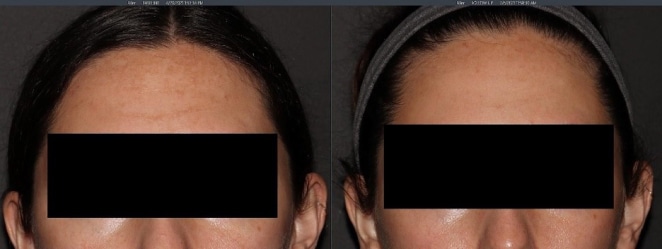Melasma
What is it?
Melasma is a condition that causes brown coloured patches and spots on mainly sun exposed areas the face, arms and legs.
What causes it? This is not completely clear, but what we know is that when a person gets Melasma the cells that give the skin its color (melanin) tends to be hyperactive (and this would make sense as to why people with darker skin tones are more at risk to develop Melasma as they have more active melanocytes at baseline)
What causes it? This is not completely clear, but what we know is that when a person gets Melasma the cells that give the skin its color (melanin) tends to be hyperactive (and this would make sense as to why people with darker skin tones are more at risk to develop Melasma as they have more active melanocytes at baseline)
Triggers Include:
- Sunlight we cannot stress this is enough and this is why it is so important to practice sun safety practices (sunscreen and avoiding prolonged periods in direct sunlight)
- Pregnancy an increase in hormones which occurs in pregnancy is thought to trigger Melasma
- Medications: anti-seizure medications, hormonal forms of birth control, medications that make your skin more sensitive to the light (some antibiotics, retinoids, some blood pressure medications)
- Stress: this is more of a controversial topic as sometimes patient’s feel we blame everything on stress; regardless, stress does cause the body to make more cortisol and an increase in this hormone can potentially trigger Melasma
- Tanning beds: a tanning bed produces even stronger UV rays than sunlight – when one exposes their skin to UV light it triggers the body to make more melanin to protect it – this pigment can appear unevenly and thus cause Melasma
- Thyroid disease: the thyroid gland makes hormones that help our body maintain its metabolism – if the thyroid gland develops an issue this can increase the risk of developing Melasma – sometimes reversing the thyroid problem can clear your Melasma
- Who typically gets Melasma:
- mainly occurs in women between the ages of 20 and 40 (women make up 90% of people that get melasma). This is likely because of the effect that progesterone and estrogen have on melasma
- medium or dark skin toned folks: develops more frequently in darker skin tones
- have a blood relative with a history of melasma: up to 40% of people with melasma have at least one blood relative with melasma
How do we treat Melasma?
- First it is important to use a special magnifying tool called a dermatoscope to see how deeply the dark pigment reaches in the layers of your skin
- Sometimes we are not sure that you are suffering from Melasma and Dr. Basanti can perform a quick and safe skin biopsy to ensure that we are dealing with Melasma
- Once confirmed we recommend: sunscreen, sunscreen, sunscreen
- Dr. Basanti does do consultations through MSP (with a referral from your family doctor) and can prescribe topical creams and also an oral medication that can help to decrease flares of Melasma
- If you have tried topicals Sorora also offers our top of the line aesthetics services to help decrease pigmentation please contact our clinic directly to get access to this technology.
Melasma Treatment at Sorora
- Lasers (Moxi and Halo): most of the time these do help to even out the pigment quicker and more effectively than our topical medications, but we will evaluate your skin thoroughly to see if you are a candidate. In some patients unfortunately any laser treatment can lead to the hyperpigmentation – it is very important to follow our aftercare tips to minimize this risk
- chemical peels: we apply a chemical to the affected skin and this can help remove excess pigment
- microneedling: this causes small microchannels (holes) in the skin and as it heals the skin tends to have a more even skin tone
- Platelet-rich plasma: this procedure involves taking a small amount of blood placing it into a machine that separates the blood into layers and then injecting the skin with the platelet rich plasma part of the blood – the platelets have numerous growth factors and have been shown to help with decreasing pigment, evening out scars and evening out skin texture and tone (we often combine this with our microneedling technology)
Discover Our Before & After Gallery
Want to see real patient results from our innovative skin treatments? View our impressive before and after images in our photo gallery.

*Individual results may vary.

